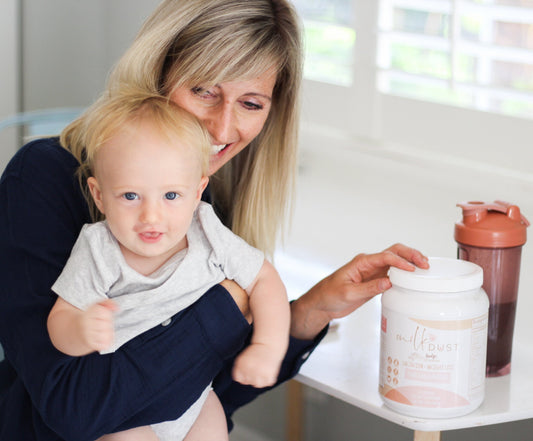Bump Dust is a new prenatal vitamin on the market that isn't a capsule, but a protein shake you can drink on the go, or blend into smoothies and coffees. As a mom of 4, and Pre/Post Natal Fitness Specialist, I found that drinking my prenatal vitamin was so much easier on my stomach than taking the capsules. Prenatal vitamins mostly come in capsule form, but on the days I took the capsules, my morning sickness was way worse (especially in the first month of pregnancy). I had to find another way to get in the essential vitamins I needed, without feeling worse!
I started with a few prenatal supplements that came in a drink form, and mainly tasted like flavored water. Fast foward through my career as a fitness specialist and nutrition coach for breastfeeding mamas, I finally created Bump Dust, a prenatal protein drink that is your all in one protein shake and prenatal vitamin! I finally had Bump Dust created for my fourth pregnancy, and I was so happy to have a delicious protein shake to take while also getting in the prenatal nutrients I needed! There are key nutrients needed in early pregnancy, and the best part about Bump Dust is I loved to drink it! I didn't have to worry about taking a pill, and I could just make my favorite shake every morning instead.
Bump Dust is super special because along with the prenatal vitamin essentials for pregnant women, it also offers additional organic superfoods, protein and essential nutrients that help fight sugar cravings and manage your weight gain during pregnancy! I am going to go over all the amazing benefits of Bump Dust as a prenatal vitamin drink, so you can see how much more you are getting than your standard prenatal vitamin.
Bump Dust offers a full prenatal vitamin panel:
First and foremost, Bump Dust offers a full pregnancy vitamin supplement panel that includes, and it offers folate, rather than the synthetic folic acid (not good more on that later!) Pregnant moms can now make an amazing protein shake that offers everything they need for a balanced diet, stronger hair, energy production and overall craving reduction!
- Folate (L-Methylfolate, not folic acid)
- Vitamin D
- Vitamin B 12 (and other B vitamins)
- Vitamin C
- Vitamin E
- Vitamin K
- Vitamin A
- 55 mg of Choline
- Omega 3 DHA
- Iodine
- Iron
- Potassium
- Protein
These are the important vitamins you want in your prenatal vitamin, with folate being one of the most important nutrients for the first trimester.
Why you need L-Methylfolate not Folic Acid in your prenatal vitamin drink:
Folate and folic acid are both forms of vitamin B9, which is important for various bodily functions, including cell division and the production of DNA. They play a crucial role during pregnancy to support the development of the baby's neural tube and prevent birth defects. The importance of vitamin B9 during pregnancy, and the fact that neural tube defects can develop very early in pregnancy (often before a woman knows she's pregnant), taking a prenatal supplement containing folic acid is commonly recommended.
However, there are differences between the two:
-
Folate: This is the natural form of vitamin B9 that is found in foods. It's naturally present in many foods like leafy greens (spinach, kale, etc.), beans, lentils, citrus fruits, and whole grains. Consuming folate-rich foods is an excellent way to ensure you're getting this essential nutrient.
-
Folic Acid: This is the synthetic form of vitamin B9 that is commonly used in dietary supplements and fortified foods. Folic acid is often added to grains and cereals to help people meet their daily requirements. It's also used in prenatal vitamins to support healthy pregnancy.
Folate: Folate is the naturally occurring form of vitamin B9 found in various foods like leafy greens, legumes, and citrus fruits. It plays a crucial role in many bodily processes, including DNA synthesis and cell division. However, the absorption and conversion of folate in the body can vary among individuals, and some people may have difficulty metabolizing it effectively due to genetic variations or other factors. L-methylfolate: L-methylfolate is the active form of folate that the body can directly use without requiring further conversion. It's also known as 5-MTHF (5-methyltetrahydrofolate). Some individuals have genetic variations that can make it challenging for them to convert folate into its active form efficiently. L-methylfolate supplements bypass this conversion step and provide the active form directly.
For pregnant women or individuals with certain genetic variations that impact their ability to metabolize regular folate, L-methylfolate supplements might be recommended. This can ensure that the body receives the active form of folate needed for various processes, including supporting the healthy development of the baby during pregnancy.
Bump Dust uses l-methylfolate to ensure that every mama can directly absorb the folate needed for baby to develop.
Bump Dust offers 14g of essential protein and amino acids:
Bump Dust is a prenatal protein powder as well as prenatal vitamin, so it mixes and blends great as a drink or a shake. Protein is really important to pregnancy, and should be in every prenatal vitamin. Bump Dust adds protein, organic super-greens like spinach, organic chlorella, and spirulina as well as the nutrition content of a full-spectrum multivitamin. No other prenatal multivitamin has all of these factors in a delicious shake.
Bump Dust offers a clean, plant-based protein blend mostly coming from pea protein, as well as additional sources like organic brown rice, organic pumpkin seed, organic chia seed and organic flax seed. This increases the amount of natural vitamins in the protein blend.
By adding protein to your prenatal vitamin drink, you can reap all of these benefits:
-
Cell and Tissue Growth: Protein is a building block of cells, tissues, and organs in both the mother and healthy fetal development. During pregnancy, there is rapid growth and development of the placenta, uterus, and various fetal tissues. Adequate protein intake supports this growth process.
-
Fetal Development: Protein plays an important role for the formation of the baby's organs, muscles, skin, and other vital structures. It contributes to the development of the baby's brain, heart, and other essential systems.
-
Supports Maternal Tissues: As the mother's body goes through changes to accommodate pregnancy, protein is required for the growth and maintenance of maternal tissues, such as the uterus and breasts. This helps support baby's development as well.
-
Immune System Function: Protein is involved in the production of antibodies and immune cells, which are important for both the mother's and baby's immune systems. It helps with a faster immune defense. A strong immune system is crucial during pregnancy to help protect against infections.
-
Hormone Production: Protein is needed for the production of various hormones and enzymes that regulate pregnancy-related processes, including maintaining hormonal balance and managing blood sugar levels.
-
Blood Volume Increase: During pregnancy, there is an increase in blood volume to support the needs of the growing baby. Protein is essential for the production of red blood cells and hemoglobin, which carry oxygen to both the mother and the baby.
-
Tissue Repair: Protein is vital for tissue repair and recovery. As the body undergoes changes during pregnancy, protein supports the repair of any damaged tissues.
-
Prevention of Pre-eclampsia: Adequate protein intake has been associated with a reduced risk of pre-eclampsia, a serious pregnancy complication characterized by high blood pressure and organ damage.
-
Muscle Health: Protein helps maintain muscle mass, which is important for overall strength and physical well-being. This can be particularly beneficial during labor and childbirth.
-
Supports Breast and Uterine Tissue: Protein is crucial for the development and maintenance of breast tissue in preparation for breastfeeding. It also helps the uterus grow and adapt to accommodate the growing baby.
It's important to note that the protein needs during pregnancy may be slightly higher than usual due to the increased demands of the growing baby and changes in the mother's body. Pregnant women are generally recommended to consume an extra 25 grams of protein per day, but individual needs can vary. Consulting with a healthcare provider or a registered dietitian is advisable to determine the appropriate protein intake based on individual factors and dietary preferences.
Bump Dust prenatal drink mix also offers a craving blend to stop pregnancy cravings:
Bump Dust uses specific ingredients like Turmeric, Cinnamon Bark and Chromium to support blood sugar and prevent cravings. This can really help with weight management, and weight loss after pregnancy, if you can manage your overall weight gain. It is much easier to lose the weight after pregnancy if you don't gain too much, and if you keep your blood sugar levels balanced. Going into postpartum, if your blood sugar is out of whack, it can inhibit or affect lactation. Chromium, according to numerous sources, "may be effective at improving the body's response to insulin or lowering blood sugar in those with diabetes. What's more, it may help reduce hunger, cravings and binge eating." Chromium is important in the metabolism of fats and carbohydrates, another important role for achieving an ideal weight. When you blend Bump Dust with fresh fruit, or frozen fruit, it tastes amazing! And you get nutrients!
The best chocolate prenatal vitamin protein shake recipe:
Blend your Bump dust up in the amazing prenatal protein shake recipe, and you will be so happy! Here's a simple prenatal chocolate protein smoothie recipe that you can try:
Ingredients:
- 1 ripe banana (provides potassium, fiber, and natural sweetness)
- 1 cup spinach or kale (provides folate, iron, and other vitamins)
- 1 scoop of Bump Dust prenatal protein powder
- 2 tablespoons cocoa powder
- 1 tablespoon almond butter or peanut butter (provides healthy fats and protein)
- 1 cup unsweetened almond milk or any milk of your choice
- 1/2 cup Greek yogurt or dairy-free yogurt (provides calcium and protein)
- Ice cubes (for thickness and coldness)
Instructions:
-
Start by adding the liquid to your blender. Pour in the almond milk (or your chosen milk) to create the base for your smoothie.
-
Add the ripe banana. Bananas not only add natural sweetness but also provide potassium and fiber.
-
Toss in the spinach or kale. These leafy greens are rich in important nutrients like folate, iron, and vitamins.
-
Add the scoop Bump Dust.
-
Add almond butter or peanut butter for healthy fats and additional protein.
-
Put in the Greek yogurt or dairy-free yogurt. Yogurt adds creaminess, calcium, and protein to the smoothie.
-
Add the cocoa powder for that rich chocolate flavor.
-
Drop in some ice cubes to make the smoothie cold and refreshing.
-
Blend all the ingredients until smooth and creamy.
-
Taste the smoothie and adjust the sweetness or consistency as needed. You can add a touch of honey or maple syrup if you prefer it sweeter.
-
Pour the smoothie into a glass and enjoy!
Remember that individual nutritional needs can vary, so if you have specific dietary concerns or restrictions, it's always a good idea to consult with your healthcare provider or a registered dietitian before making significant changes to your diet, especially during pregnancy.



